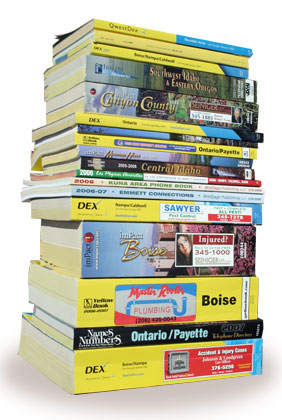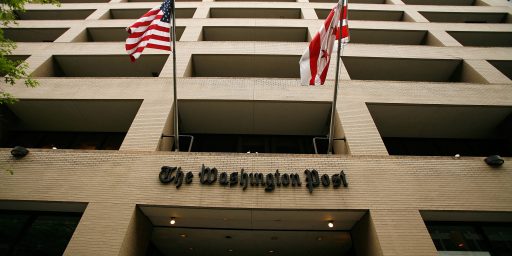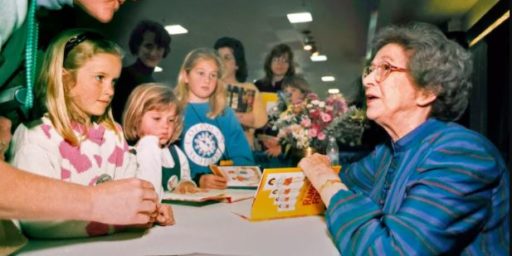Paper Phone Books Are Obsolete
 Claire Thompson issues a call to get rid of the paper phonebooks, citing a recent study paid for by a company that competes directly with same that “only 15.9 percent of U.S. adults recycle their old or unwanted phone books, and that U.S. citizens are largely unaware of the environmental impact of printing and delivering so many phone books.” Said company is sponsoring a program wherein people would only get their competitor’s product if they specifically asked for it.
Claire Thompson issues a call to get rid of the paper phonebooks, citing a recent study paid for by a company that competes directly with same that “only 15.9 percent of U.S. adults recycle their old or unwanted phone books, and that U.S. citizens are largely unaware of the environmental impact of printing and delivering so many phone books.” Said company is sponsoring a program wherein people would only get their competitor’s product if they specifically asked for it.
Resisting the temptation to note the irony, Kevin Drum notes that he rarely uses his paper phone book and that he indeed recycles his old ones because his community makes it easy. He observes,
The really mysterious part of all this, though, is that despite the fact that phone books seem like they ought to be a dying breed, there are more of them than ever. I just looked, and we have not one, not two, not three, but four different yellow pages directories. One from Verizon, one from Yellowbook, and two from AT&T (they come in two different sizes for some reason). They’re all crammed with ads, which must mean people are using them, but I do sort of wonder who that is sometimes. I use the web almost exclusively for this kind of thing these days, and I imagine that most people in my upscale neighborhood do too. So why all the phone books?
Presumably, because there’s money to be made in selling ads in them by convincing businesses that widespread distribution equals widespread use. This is the same strategy that, for example, has the Washington Post frequently offering to give me the other six days free along with my existing Sunday edition if I’ll merely agree to take them. I decline on the grounds that having to go fetch a paper six times merely so I can recycle it is not attractive.
One presumes that there are people who still find the listings of businesses by type useful on occasion. And, I suppose, it would be handy if one’s power and/or Internet connection were down. I’m a straight-to-recycle guy myself.






Phone books come in handy when I am at work (no computer close to the phone with an outside line), but at home all our phone books go into the trash (no paper recycling in our town). If I need a phone number I look it up on the computer and most of the numbers I call regularly are stored in my cell phone.
To paraphraase Pauline Kael, I guess you don’t know anybody who’s not on the Internet.
In absolute terms there are still a large number of people who have never used Craigslist, E-Bay, Google, etc. Eliminating their access to business contact info to satisfy one vendor whose argument seems to be, “My competitors are bad people because their product doesn’t get recycled often enough, so let’s put them out of business by fiat so my ecologically superior product (which can’t beat them in the marketplace straight up) will win,” would seem to be a bad, regressive idea.
There’s no reason why an Internet replacement couldn’t do the same thing.
I do occasionally use a hardcopy maybe 2-3 times per annum, mostly because I’m downstairs away from the computer. I don’t think that justifies the 3 or 4 versions that we receive each year. Like Drum, I get one in two different sizes for some reason – what a colossal waste.
ATT&T provided a CD Rom version of their yellow pages with the last paper copy they dropped off. I dumped the paper one and installed the CD.
I don’t actually use it all that much as Google works faster for me. But it’s there when the Internet is down and I’ve used it once or twice in the past year.
I haven’t used a phonebook in about 20 years, I wish they’d stop leaving them on my doorstep and I wish they would take orders for them instead of killing a lot more trees than necessary to provide booster seats or something to burn when you’re out of firewood.
As far as I know, phone books are not recyclable, except for making more phone books.
I rarely use a phonebook, but a recent road-trip showed me how often I’m out of 3G or even E data coverage.
Get up there to the ranches in the Great Basin and tell them no more phone books.
Here in DC, Verizon dumps 50 phone books outside the front door of our condo every year. Only a few residents take them so the rest sit there until I carry them to the recycle bins.
Verizon won’t stop delivery unless each resident calls individually to “opt out” and, of course, they won’t come take away the unwanted ones.
I’m glad someone brought this up. For years, we couldn’t recycle phonebooks for curbside pick-up where I live, we had to take them to special “phone book” bins at various strip-mall parking lots around the city. Since we could recycle newspaper, magazines, and junk mail, my operating theory was that the phone books were only being recycled by the phone book companies.
That’s changed today, but I do wonder if phone books still have special recycling treatment that lowers the recycling rate.
I still use the phone book probably once a week. I find the need to contact businesses that have poorly organized web pages/presence or none at all.
What a difference a few years makes. Sometime in the 1980s or early 1990s, I asked one of the phone companies for a phone book from an area outside of my residential area. The company wanted to charge me something like $20 for the phone. Now I look up things via Google Maps on my three-year old smartphone and haven’t cracked open a phone book in at least a couple of years.
Right now the phone book producers are stuck, because they are promising a certain distribution to advertisers, and are therefore reluctant to remove anyone from the phone book distribution list. Eventually, however, advertisers will calculate that most phone books remain unopened and will demand much lower advertising rates. Then the phone book market may change.
Oh yeah, and the less people seem to value their phone books, the higher advertising rates appear to get. The ever-closing circle ain’t a pretty sights. Same with newspapers.
I almost never use the White Pages these days. I use the Yellow pages about once a month. My most recent was to find the best price for refilling propane tanks – I had 2×5 gallon tanks to refill.
– The Blue Rhino “refill” is a total ripoff, under 4 gallons for over $23. They don’t tell you how much they filled them to. They are getting sued for under 4 gallons.
– Local Gas Station. 4.2 gallons for $18 (so ~$4.20/gallon)
– Fuel Oil place $2.29/gallon.
– Propane appliance store 5 miles down the road $1.69/gallon. I filled two tanks filled to 4.8 gallons for well under the price of a Blue Rhino exchange. Under the price of my local gas station too.
@Richard Gardner: Good to know on the refills. I’ve always thought the exchanges were ridiculous but don’t refill my 3 tanks often enough to have taken the time to shop around.
My auto mechanic is in his sixties and has been running his shop for many years. He always asks new people where they heard of him and, after more than a year of the Yellow Pages being missing from that list dropped his ad and asked me to put up a web page for him with, at my suggestion, meta tags for search engines. Three months later eleven people had answered his question, “Found you on the Internet.”
I live in a small town (5,000), so hauling out the phone book isn’t weight-lifting. We use it often.
And we aren’t particularly high-tech, so when we are on the boring drive to the rental property I often use the phone book for that area to locate one business or another.